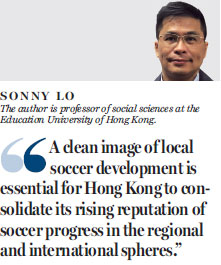Ethical campaign needed for the rising local soccer sector
Updated: 2016-10-21 06:10
By Sonny Lo(HK Edition)
|
|||||||||
With local soccer developing encouragingly and rapidly in recent years, it came as a rude reminder that the Independent Commission Against Corruption (ICAC) is again investigating a suspected match-fixing attempt in a local game. Regardless of the investigation's outcome, the local soccer clubs, managers and the Hong Kong Football Association (HKFA) will have to work more assertively with the ICAC on an ethical campaign targeted not only at local, mainland and overseas players but also all the managers, coaches and assistant coaches involved in soccer development. A clean image of local soccer development is essential for Hong Kong to consolidate its rising reputation of soccer progress in the regional and international spheres.
In fact, since September 2014 the HKFA has been cooperating with Sportradar to monitor betting statistics on all local matches and analyse whether suspected irregularities might have been detected in the statistical trends. Credit must be given to the HKFA for this important initiative to prevent any corruption in this era of globalized soccer gambling. Many other soccer-mad countries like Italy have been affected by the way soccer gambling has been taking places across various national boundaries. Unsurprisingly, Hong Kong has already been affected by the increasing trends of tainted soccer gambling.

In June 1998, three local soccer players were arrested by the ICAC for their role in match-fixing during a match between Hong Kong and Thailand. The three young players, who were emerging rapidly in local soccer at that time, were imprisoned for 22 months and fined HK$30,000 each. The trio, plus another local player, were also banned for life from playing soccer locally. Today's young players should never forget the lessons of this infamous incident in local soccer.
Despite this case, the ugly specter of attempted match-fixing still occurs here from time to time. In May 2010, a player from the Happy Valley Club was arrested by the ICAC for attempting to pay bribes to four local soccer players, and was eventually jailed for 10 months. He had seriously underestimated both the importance of ethical standards in the sport and the effectiveness of the ICAC's work.
In November 2011, a young local player lobbied two of his teammates to fix the result of a match between Hong Kong and a Russian youth team. He was found guilty of attempting to pay bribes and was sent to a correctional center. He offered those players seriously tempting bribes of HK$40,000 to fix the result of the match and benefit himself monetarily. To their great credit the two targeted local players rebuffed his attempts to bribe them.
In January 2014, the ICAC swooped on seven players and a representative of a sponsoring company for attempted match-fixing. While a foreign player was found guilty of fixing the match and jailed for one year, a player who was also an assistant coach was found not guilty. And an assistant manager admitted he had gambled on the match through offshore betting means and was eventually fined HK$4,000. This case showed that the suspected match-fixers included not only foreign but also local players and managerial staff. It also demonstrated that any ethical campaign in local soccer development should target not just players but also all other people involved, embracing coaches and managers as well as sponsors' representatives.
The above litany of match-fixing attempts in Hong Kong proves that while our young local players must appreciate the meaning of sportsmanship, namely trying one's best to play a game without any unethical behavior, the players from other jurisdictions should also adopt the same high ethical standards. Now that the Chinese mainland's soccer development is aiming at achieving high standards on the international scene, the players from both the mainland and Hong Kong must stick to the principle of trying their best in all soccer games professionally while treating with scorn any temptation of receiving money in exchange for unethical behavior. Club officials like managers, coaches and assistant coaches plus trainers and sponsors' representatives must also play the role of gatekeepers to guard against any malpractices in local soccer matches and development.
With the globalization of soccer gambling, quite often some young and inexperienced players and even experienced ones may be tempted to risk their good reputation in exchange for short-term monetary benefits. As such, the ethical campaign targeted at local soccer players and administrators must continue so that the HKFA and ICAC can work closely together to help local soccer develop to high standards and thus earn the respect of local fans and soccer enthusiasts around the world.
Finally, before the start of every new soccer season the details of the above historic corruption cases in local soccer development should be circulated among all players and administrators in the local soccer clubs so they realize that every single match is under official scrutiny, and the penalties imposed on cheats are usually imprisonment, heavy fines and lifelong playing bans.
Soccer fans expect the players to play their matches with real professionalism and dedication, and they also expect coaches, assistant coaches and managers to be the most effective gatekeepers preventing our soccer development from being polluted by corruption.
(HK Edition 10/21/2016 page11)